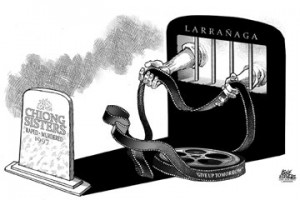Film with a point of view
 “I’ve watched it three times…. It made me angry.” This reaction by celebrity host Boy Abunda after watching “Give Up Tomorrow” is one reason to watch the documentary film about the nightmare of Paco Larrañaga and six others. The film’s premise is clearly one intended to stir up indignation.
“I’ve watched it three times…. It made me angry.” This reaction by celebrity host Boy Abunda after watching “Give Up Tomorrow” is one reason to watch the documentary film about the nightmare of Paco Larrañaga and six others. The film’s premise is clearly one intended to stir up indignation.
Injustice and suffering are justifiable reasons to get riled up, even if the facts presented of a heinous crime of kidnapping, gang rape and murder of two innocent girls in Cebu City, happened 15 years ago in a case settled with finality by the Supreme Court.
There’s no mistaking the premise of the 90-minute film. It opens with a close-up interview with a young, chubby Larranaga, in his early 20s waiting on death row, insisting “I’m innocent” “I wasn’t given a chance to defend myself”.
It’s a film with an unabashed point of view.
That’s what the audience gets quickly when the interviewer’s voice in the background asks the prisoner, “Who framed you?” Then images cut away to begin the narrative of Cebu’s “trial of a century”.
At the end of the film, the viewer is left incredulous about how a trial court could convict a 19-year-old culinary student for a crime that took place in Cebu City when he was seen by 40 classmates and friends taking his exams in school in Quezon City and relaxing with them at a bar till dawn.
The selective lens of the director, who distills seven years of research about a 1997 crime and an almost circus-like trial of the “Chiong 7”, is a powerful tool.
The expert use of TV news footage, newspaper clips and documents give authority to the film and faithfully follow the basic narrative of the case. But don’t expect a complete picture.
For example, it doesn’t say why defense lawyers deliberately didn’t present their client as a witness until a frustrated Paco Larrañaga waved his hand in the air, trying to catch the judge’s attention. By then it was too late, the presentations were closed.
Neither does the documenatry dwell on why the Supreme Court upheld a Cebu court’s guilty verdict: That an alibi that you were somewhere else, even if sworn to by a platoon of schoolmates, would not trump an eyewitness. And that the High Court relied not just on the testimony of state witness Davidson Rusia, a former drug user with a shaky past, but the testimonies of three other unrelated eyewitnesses and physical evidence that corroborated Rusia’s account of a boys’ wild night out.
This aspect alone makes the film worth showing in law schools, legal circles, bench and bar associations, and to anyone concerned with the criminal justice system.
Legal doctrines and lawyers’ maneuvers shouldn’t lock up the search for truth, yet it seems in this case they left the conclusion with surreal elements and an ending open to more speculation.
The film was meant to stir doubt, attack the neat judicial conviction of six young men (two of them were barely 18) and provoke discussion about how corruption and incompetent police work can ruin the lives of ordinary citizens.
Yes it can shake one’s faith in the Philippine justice system very hard.
How many death penalty convictions by the Supreme Court do you hear being lobbied against by a commission of the United Nations committee on human rights, the European Parliament, the international Fair Trials Abroad advocacy group and Spain’s president?
It’s good to keep in mind that the practical objective of showing “Give Up Tomorrow” is not to win film fest awards but to raise public awareness high enough to apply political pressure on the Philippine and Spanish government to release Larrañaga from his Madrid prison – because all conventional legal remedies have already been tried, with some success.
Larrañaga and everyone on death row was spared a lethal injection when the death penalty was scrapped in 2006.
He left the cramped hell hole of Muntinglupa as an exchange prisoner flown to Madrid.
Now 34 years old, the Bisaya-weaned Larrañaga is a lean, middle aged fluent Spanish speaker who would rather wait out his life in prison till he’s 62 years old, than tell a parole board he’s guilty.
If he and the six others didn’t do the deed, who did? Who framed Paco?
Without an answer, the story doesn’t end neatly at all.
The fullness of the truth remains somewhere beyond the reach of a point of view.














